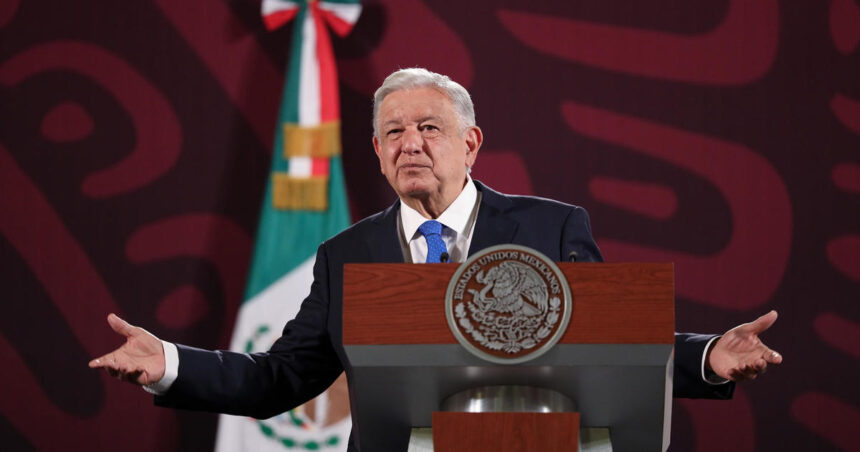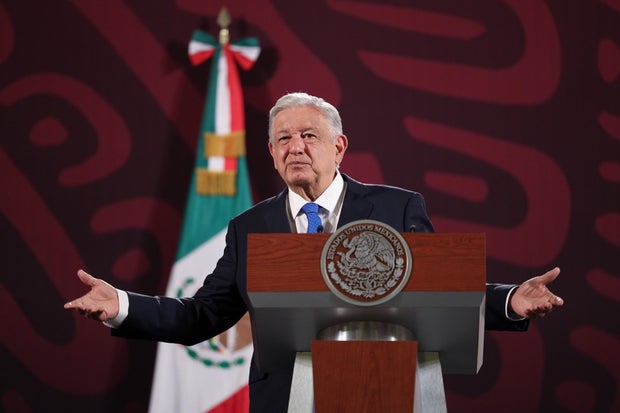Journalists told the Mexican president Tuesday that supporters had harassed him while trying to cover events in June, and complained that the polarization of Mexican society put journalists at risk.
When he asked what he would do, President Andrés Manuel López Obrador reacting with a mixture of scorn and disinterest, he simply said “nothing, nothing, nothing.”
In his daily press conference on Tuesday, the president also said that other reporters he does not like are DEA agents or informants. In a country where drug cartels are dominant, this is a deadly charge; at least 142 journalists and media workers have been killed in Mexico since 2000.
Just a few days ago, a journalist documented one of the most dangerous crimes in the country killed by armed menand two guards assigned by the government were wounded.
Journalists have long complained that they often suffer verbal attacks from López Obrador, who falsely accuses some of them of being paid to support conservatives.
While López Obrador has held more news briefings, and answered more questions than any previous president, journalists have also complained about suffering, online and in person, from the president’s die-hard supporters if he asks tough questions.
It came on Tuesday when independent journalist Reyna Ramírez described the incident in June when an angry mob of the president’s supporters approached her, angrily shouting “sold out journalists”, and forced her to flee from the event she was covering.
“I’m at risk because of this, now anyone can attack me on the street,” Ramírez said. “You have polarized society. “Don’t you have anything to say about that?”
“Have you been there long enough?” López Obrador responded. Pressed to answer what he would do to control his supporters, he said “nothing, nothing.”
In just a few minutes, López Obrador attacked journalist and author Anabel Hernández, whose latest book describes alleged ties between the current administration and Mexican drug cartels. The president claimed Hernández “is a DEA agent or informant.”
Mexico’s president refuses to confront drug cartels, saying drug traffickers are people who have chosen the wrong path in life but claims to “respect the citizens.” López Obrador denied that he had made a deal with the cartel and claimed, without providing evidence, that the allegations were part of a DEA plan to frame him.
This is not the first time the president has attacked Hernández.
“It’s frustrating that the president sees the narcos as part of the people, but sees the journalists who investigate them as the enemy,” Hernández said.
Saul P. Gonzalez/Getty Images
In May, he complained that López Obrador’s hostility and accusations made it difficult for him to work.
“With the president’s aggressiveness and hate speech, there is no way to do the book presentation,” Hernández said at the time. “It would be very dangerous for me, and for the people attending.”
While López Obrador says he is more open to the press than previous Mexican presidents, his daily news briefings tend to pick football questions from sympathetic news outlets.
In the past, López Obrador has used secret tax and banking records to publish the salaries of journalists he does not like, and to reveal the personal phone numbers of foreign correspondents.
International press freedom groups have criticized the president’s attacks on the press, as have the US State Department and the Organization of American States, noting that journalists who have been exposed are at greater risk.
Media employees are regularly targeted in Mexicooften in direct response to his work covering topics such as corruption and the country’s notorious drug traffickers. 2022 is one of them the deadliest year for journalists in Mexico, with at least 15 dead.
All but a few murders and kidnappings remain unsolved.
“Impunity is the norm for crimes against the press,” the Committee to Protect Journalists said in a report on Mexico in March.
Claudia Sheinbaumwho will be Mexico’s first female leader in more than 200 years of independence, will take office this fall.





